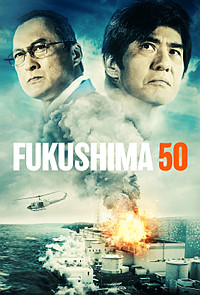| SHADOWS ON THE WALL | REVIEWS | NEWS | FESTIVAL | AWARDS | Q&A | ABOUT | TALKBACK | |||||||||||||||||||||||||||||
 Shadows off the beaten path Shadows off the beaten pathIndies, foreign, docs and shorts...
On this page:
FUKUSHIMA 50 |
KEEP AN EYE OUT |
WHITE COLOUR BLACK
| |||||||||||||||||||||||||||||
| See also: SHADOWS FILM FESTIVAL | Last update 7.Mar.21 | |||||||||||||||||||||||||||||
|
Fukushima 50 Review by Rich Cline | 
Is it streaming?
| 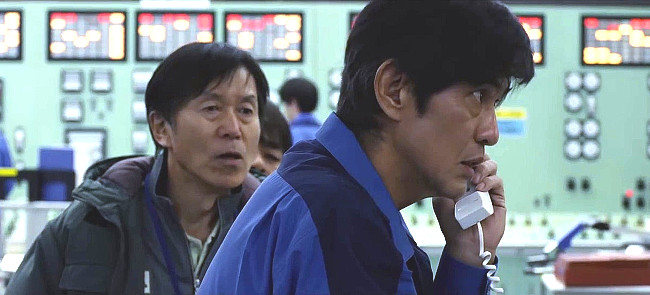 This is a big-scale dramatised recreation of the momentous events of March 2011 at Japan's Fukushima Daiichi nuclear power plant. Director Setsuro Wakamatsu keeps things moving briskly on several fronts, creating dramatic urgency over a frantic five days as 50 workers struggle to contain the meltdown. Understandably, this is a worthy depiction of heroism, so the old fashioned filmmaking suits it well, offering human detail behind the headlines. One of the biggest earthquakes ever measured hits off the Japanese coast, sending an enormous tsunami over Fukushima's protective seawall. With emergency power supplies knocked out, there's no way to pump cold water to cool the reactors. And a meltdown would destroy Tokyo and everything around it. Power company executives and government officials pressure manager Yoshida (Watanabe) to find a solution, while shift supervisor Izaki (Sato) leads the team on-site. But damage and aftershocks complicate things, and as radiation levels rise and cores overheat, experts will need to try untested methods to avoid catastrophic disaster. The film features a lot of men screaming at each other in panic, from clueless political leaders to low-level workers who know exactly what needs to be done at ground zero. The actions of these men provided time for the local residents to be evacuated, and each moment is punched with a large time-stamp. Watching this "suicide squad" head straight into the hot zone is powerfully moving. These men know they're the only hope to avert a horrific explosion, and they never give up. The enormous, predominantly male ensemble cast evokes escalating tension, drama and emotion as the veteran workers try to protect their younger colleagues from injury, always thinking about their families. With plenty of gravitas, Watanabe and Sato provide focus for the audience as Yokohama faces impatient officials and Izaki puts his loyal men in danger. The textures in their performances hold together the sprawling sense of scale. There are also a few cutaways to family members and other civilians, plus the Americans who staged a relief mission. Best of all is the way the filmmakers hark back to vintage Japanese monster movies to show the tension between self-serving bureaucrats, frightened family members and plucky heroes bravely confronting unthinkable danger on the frontline. Action beats are sudden and genuinely terrifying, while quiet moments offer a bit of introspection, including an extended epilog. And after watching two hours of this nightmare situation, it seems almost like an understatement to note how arrogant humans are to believe they can control nature.
|
| Keep an Eye Out Au Poste! Review by Rich Cline | 
| 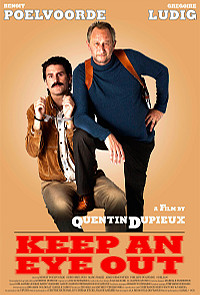 dir-scr Quentin Dupieux prd Mathieu Verhaeghe, Thomas Verhaeghe with Benoit Poelvoorde, Gregoire Ludig, Marc Fraize, Anais Demoustier, Philippe Duquesne, Jacky Lambert, Orelsan, Jeanne Rosa, Vincent Grass, Laurent Nicolas, Michel Hazanavicius, Alain Chabat release Fr 4.Jul.18, US 5.Mar.21 18/France 1h13 Is it streaming?
| 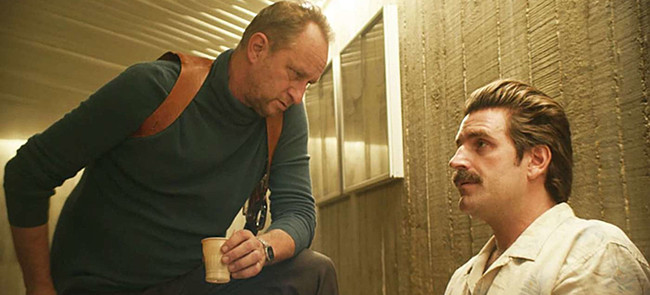 With an absurd sense of humour, this police farce is impeccably assembled to keeps the audience chuckling at subtle gags while a investigation unfolds in the background. A master at orchestrating nuttiness, writer-director Quentin Dupieux has a lot of fun with period-evoking settings, bonkers characters, surreal dialog and ironic violence. It's more than a little silly, but there's enough visual panache and thematic depth to make it worth a look. In a 1970s-style police station, Louis (Ludig) is struggling to give a statement to Chief Inspector Buron (Poelvoorde) about the night he discovered a dead body. When Buron is called away for family reasons, he assigns Detective Philippe (Fraize), who was born with only one eye, to watch Louis. But things take an startling, accidental turn. So when Buron returns and Louis continues recounting his tale, he's now concealing something that's completely unrelated. It certainly doesn't help that every event Louis describes is invaded by people he can't get off his mind. The humour is so dry that it can't help but catch us off-guard, both little details in the narrative and more wildly insane touches on-screen, such as the hole in Buron's chest that leaks when he smokes, or the distinctive way Louis eats shellfish. Then as Louis tells his story about the fateful night, the wrong people turn up in his flashbacks, sending things spinning off in various amusing directions. But no matter how far off the track they go, there's still at least one death that needs to be explained. Performances are offhanded, allowing each actor to be the straight man as the jokes leak out of their conversations. Ludig is terrific as a hapless man telling a rambling story packed with ridiculous details, while the audience knows he's hiding something rather a lot bigger. Opposite him, the superbly offhanded Poelvoorde is engagingly thorough and impatient, even as he drifts off into his own random sideroads from time to time. And side characters are flatly hilarious. This is a witty exploration of perspective and perception, revealing how what's logical for one person can seem preposterous to others. Bruton reminds Louis that his stupid questions are designed to test the coherence of his account. So Bruton's instincts give him doubts, leading to a moment that literally breaks the fourth wall, poking fun at the way grisly investigative police thrillers are devised for entertainment. It's a fiendishly clever look at the absurdity of most drama as well as the vagaries of the justice system.
|
| White Colour Black Review by Rich Cline | 
| 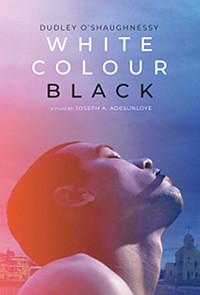 dir-scr Joseph a Adesunloye prd Joseph a Adesunloye, Joy Gharoro-Akpojotor with Dudley O'Shaughnessy, Yrsa Daley-Ward, Alassane Sy, Wale Ojo, Guetan Calvin Elito, Damola Adelaja, Lily Dodsworth-Evans, Jamey May, Cabral Nathias Elodie, Ayvianna Snow, Lynne Anne Rodgers, Tommy Roca release UK 1.Mar.21 16/UK 1h27  Is it streaming?
| 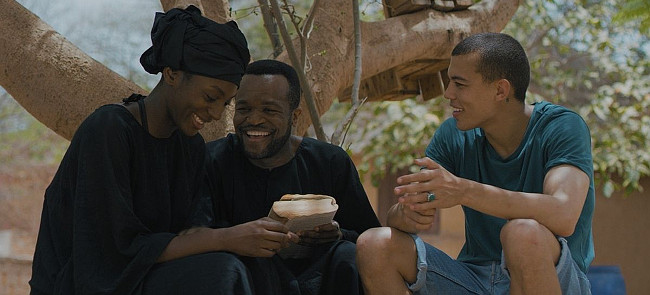 Understated filmmaking vividly catches a youthful sense of seeking hedonistic freedom while yearning for deeper meaning, bridging the universal theme from urban Europe to rural Africa. Filmmaker Joseph Adesunloye quietly taps into this idea, as he sends a young man on an autobiographical odyssey of self-discovery that's pointed but never pushy. The various ideas that swirl around in this story have real power, and the storytelling is unusually delicate. In London, free-living photographer Leke (O'Shaughnessy) is excited that his latest exhibition is transferring to Shanghai. Celebrating with his best pal Tunji (Elito), he is preoccupied with news that his estranged father is dying in Senegal. And now Leke gets word that he needs to go bury him. As he reacquaints himself with the country where he was born, snapping photos around the city, he befriends taxi driver Assamane (Sy) and starts a highly sexualised relationship with Badewa (Daley-Ward). Finally, he heads to his father's village, where his worldview is going to be challenged. With gorgeous cinematography by Rory Skeoch, the film's quiet, almost melancholic tone draws the audience in, letting us see Leke's thoughtfulness underneath his hard-partying rising-star persona. The camera knowingly captures details in each of the settings, moving from England to Senegal while maintaining Leke's watchful eye as he tries to balance his mix of European and African roots. And the shift from urban to rural settings adds another layer of meaning, and a lovely flicker of humour as well. This allows some remarkably subtle moments to carry a big impact. With his striking supermodel looks, O'Shaughnessy has terrific presence on-screen. His physicality is remarkable, evoking a range of inner thoughts that compel the audience to take this journey along with Leke. His inner turmoil is intense, warm childhood memories mingled with suppressed guilt. So watching him connect with his heritage is powerfully moving. Cleverly, the characters around him are played with a terrific matter-of-fact edge. Daley-Ward is particularly strong as both the urbane Badewa and her earthy village-dwelling sister Esther. Director Adesunloye has a terrific eye, catching telling elements of culture in a variety of beautifully rendered places, from bustling cities to dusty villages to expansive beaches. The nuances in each of the film's sections are provocative, perhaps resonating differently for each viewer. And if the light-handed approach sometimes leaves the film feeling slow and enigmatic, there are hugely involving connections everywhere. It's a skilfully told, specific story that can speak to paople all over the world.
| 
See also: SHADOWS FILM FESTIVAL © 2021 by Rich Cline, Shadows
on the Wall
HOME | REVIEWS | NEWS | FESTIVAL | AWARDS
| Q&A | ABOUT | TALKBACK | | ||||||||||||||||||
